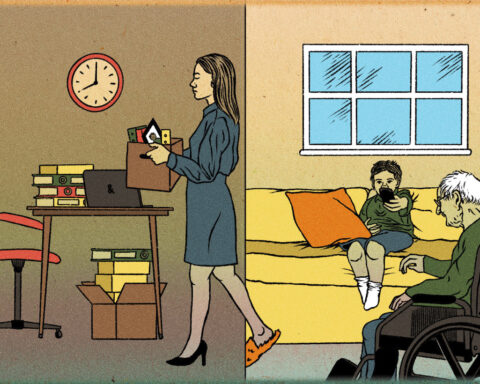Buzzwords describing the digital dating scene are all over social media. Have you been ghosted? Is someone orbiting you? Are you being breadcrumbed? While these dating patterns may not be new, the words to describe them continue to evolve.
As a psychotherapist, I see firsthand the impact these experiences can have on mental health. Given the sheer number of people using dating apps – 53% of American 18-to-29-year-olds and 37% of 30-to-49-year-olds – it’s likely you have some first- or secondhand exposure to this world.
If you’re curious about the latest psychological research on digital dating – and are looking for evidence-based strategies to cope – read on.
Ghosting and orbiting
Ghosting is a sudden disruption in a relationship without any explanation. The “ghoster” vanishes suddenly, often leaving the other person with questions. And orbiting? That’s when someone ghosts but continues to follow the other person on social media by watching stories or occasionally engaging in their content. These behaviors are pretty common, and you might wonder about their impact.
A 2022 study compared the psychological consequences of being ghosted, orbited or rejected by asking 176 participants about one randomly assigned breakup strategy they had experienced out of these three. Then, participants completed a questionnaire rating various feelings about their breakup.
While feelings of rejection did not differ between the three breakup strategies – the end of a relationship hurts regardless – the results showed that ghosting led to stronger feelings of exclusion than being rejected outright. People in the ghosting category were also more likely to feel that their basic needs of belonging, self-esteem and control were threatened.
Being orbited, on the other hand, seemed to buffer victims partially from the emotional consequences of a breakup. Victims of orbiting, too, reported feeling higher levels of exclusion and threat to their basic needs than those who were rejected outright, but less than victims of ghosting did. Perhaps sporadic attention softens feelings of exclusion.
These findings are in line with other research. Understanding a breakup is important and helps individuals recover from the event. With no explanation, the rejected individual may be left feeling confused and uncertain, sometimes with unhealed psychological wounds.
Orbiting may cause further ambiguity, as the orbiter’s behavior suggests a mild residual interest in the other person. An individual might wonder if the other person is still attracted or might want to return to the relationship. For some people, this uncertainty can be harmful, while others find it easier to let go of a relationship if they’re still receiving some level of digital attention.
A pair of studies in 2004 and 2005 showed people prefer receiving negative attention over being ignored entirely. In these role-playing experiments, those who experienced ostracism reported lower levels of belonging, control, meaningful existence and superiority than those who experienced an argument.

Breadcrumbing
Breadcrumbing is when someone drops morsels of flirtatious attention to keep the other person interested, even though they have no intention of participating in a relationship. Some classic signs of breadcrumbing are not responding to messages for long periods of time, vague communication, and avoidance of discussions related to feelings. These patterns tend to boost the breadcrumber’s ego, self-worth and sense of power.
For the person being breadcrumbed, it’s a different story. A 2020 study of 626 adults found victims of breadcrumbing were significantly more likely to have feelings of loneliness, helplessness and less life satisfaction than victims of ghosting. Because people on the receiving end of breadcrumbing remain in limbo longer, they experience repeated feelings of exclusion and ostracism. The ongoing nature of breadcrumbing explains why it can have more negative effects on mental health.
Taking care of yourself
Given the prevalence of these behaviors, it’s likely you’ve employed some of these dating tactics yourself. If so, I invite you to be mindful and think about how these patterns are serving you and consider your impact on others.
If you’re also on the receiving end, here are some evidence-based strategies you can use to support yourself and maintain a positive outlook about the dating scene.
Any time you have an experience, your mind is quick to create a narrative around what happened in order to make sense of it and create an illusion of control or safety. If you’re not aware of the stories you tell yourself, you may find yourself incorrectly assigning blame or fault, which can lead to negative self-talk, anxiety and depression.
For example, rather than think, “I did something wrong to cause them to ghost me,” you could think, “Their decision to disengage from the relationship is more about them and how they relate to others than it is about me.” Being mindful of your cognitive patterns and practicing changing your narratives can help keep online dating from wreaking havoc on your psyche.

It’s also crucial to take inventory of what’s most important to you. Identifying your values will not only allow you to better match with like-minded people, but it will also improve your relationship with yourself. When your life aligns with what’s important to you, you increase its meaning, purpose and overall well-being. In living this way, you might find looking for a relationship is less urgent, which could help you to better spot red flags or mismatches.
I also recommend varying the ways you connect to others to mitigate burnout. A healthy mix of apps and meeting people “in the wild” will often yield the best outcome and allow the dating adventure to remain exciting.

Danielle Sukenik does not work for, consult, own shares in or receive funding from any company or organization that would benefit from this article, and has disclosed no relevant affiliations beyond their academic appointment.
Source: The Conversation

 Peyote sacred to Native Americans threatened by psychedelic renaissance and development
Peyote sacred to Native Americans threatened by psychedelic renaissance and development
 Trump has pressed for voting changes. GOP majorities in Congress will try to make that happen
Trump has pressed for voting changes. GOP majorities in Congress will try to make that happen
 US holiday retail sales come in above forecast, Mastercard says
US holiday retail sales come in above forecast, Mastercard says
 Why this Mexican American woman played a vital role in the US sacramental peyote trade
Why this Mexican American woman played a vital role in the US sacramental peyote trade
 What is the Native American Church and why is peyote sacred to members?
What is the Native American Church and why is peyote sacred to members?
 Speculation mounts over cause of Azerbaijan Airlines plane crash that left at least 38 dead
Speculation mounts over cause of Azerbaijan Airlines plane crash that left at least 38 dead
 AI is a game changer for students with disabilities. Schools are still learning to harness it
AI is a game changer for students with disabilities. Schools are still learning to harness it
 Futures lower in holiday-thinned trading
Futures lower in holiday-thinned trading
 About a third of U.S. adults have looked for love online.
About a third of U.S. adults have looked for love online.







